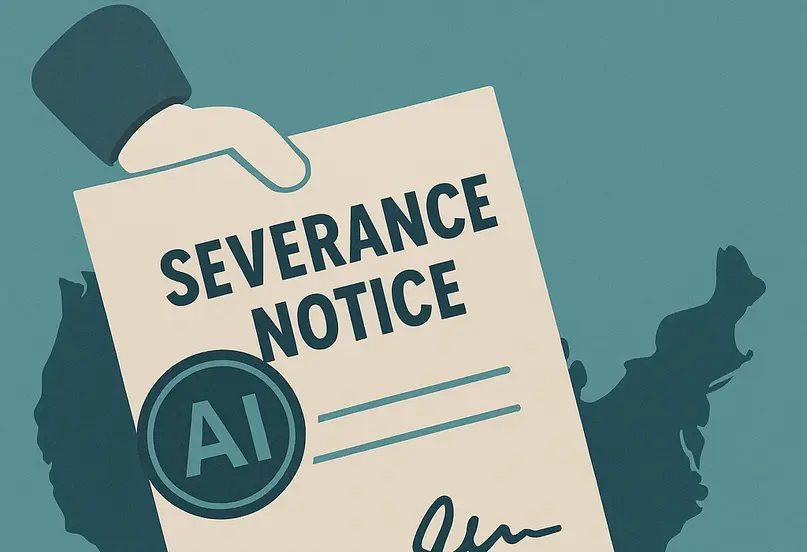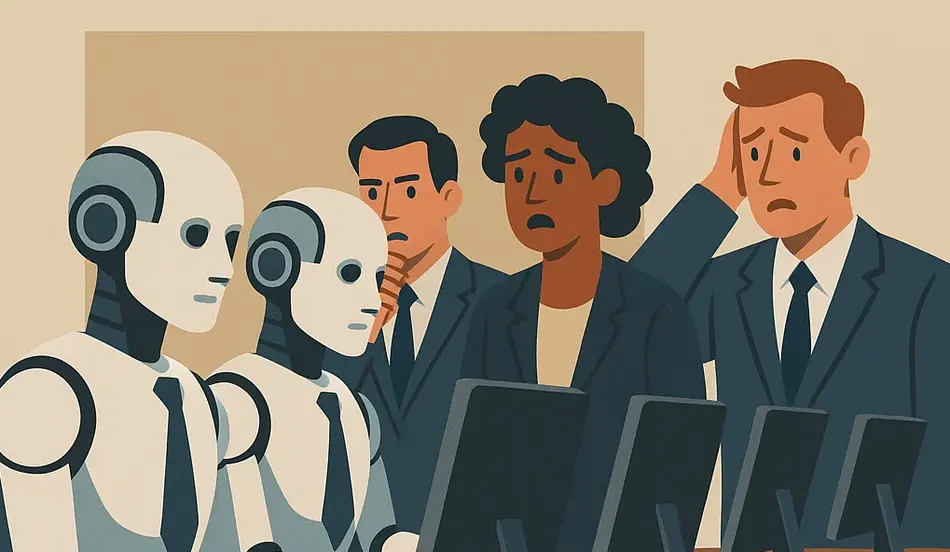AI job cuts in America 2025 are driving a major transformation in the tech industry. Companies like IBM, Meta, and Microsoft have implemented widespread layoffs as they increasingly turn to artificial intelligence to perform tasks once handled by skilled professionals. What was once considered America’s most stable and lucrative career path is now under threat, with thousands of well-paid workers abruptly displaced by automation and generative AI technologies.
IBM’s AI Revolution: 8,000 Jobs Cut in Days
Earlier this month, IBM replaced approximately 200 human resources roles with AI agents capable of handling repetitive tasks like responding to employee emails, processing paperwork, and reorganizing data with minimal human supervision. This automation push coincides with IBM laying off 8,000 employees in just days, following 9,000 terminations months earlier.
“IBM’s Ask HR agent now automates 94% of HR tasks, including pay statements,” according to recent reports. With IBM being one of the world’s largest tech employers with nearly 300,000 staff according to 2024 reports, this shift signals a dramatic transformation in how major corporations view their workforce needs.
Beyond IBM: The Widespread Tech Industry Crisis
The crisis extends far beyond a single company. Major tech employers are implementing similar strategies:
- Microsoft has laid off approximately 6,000 people (3% of its workforce) and continues cutting positions
- Meta has conducted multiple rounds of layoffs affecting thousands of employees
- Google has terminated staff across various departments, including experienced engineers with 5-7 years of tenure
These layoffs are particularly devastating because they target positions once considered secure, high-paying career paths. Software engineers, HR professionals, and other specialized tech workers are discovering that years of education and experience provide little job security in an AI-driven economy.
The Human Cost: Real Stories from Displaced Tech Workers
Behind the statistics are real people facing career devastation. Social media platforms are filled with emotional accounts from laid-off tech workers:
From Yale to Unemployment
“I’ve been looking for a job for the past 6 months. I think I applied to over 500 jobs and I can’t find anything. It’s a little disheartening. I went to Yale, which is probably $250,000 for 4 years, and I just don’t have anything right now. 3.8 GPA, studied econ.”
Google’s Unexpected Terminations
“A lot of people don’t know my full-time job has been at Google for the last seven years, and I got laid off today and I am still processing that information. I know I’ll be fine. I’ll be fine. The severance was good.”
“After 5 years of working at Google, I was laid off on Friday. I was a software engineer on Google Docs. I worked on a lot of user-facing features, including bringing emoji reactions to Google Docs. I found out while I was on vacation with my family.”
These personal stories highlight how even elite education and experience at prestigious companies no longer guarantee job security in the tech sector.
The AI Replacement Strategy: Corporate Leaders Speak Out
Corporate leaders are increasingly open about their strategy to replace human workers with AI systems:
📉 Affected by AI Job Cuts in America 2025?
Thousands of skilled professionals are being displaced as AI reshapes the tech industry.
WhatJobs is here to help you bounce back — with access to high-quality roles in AI, Cloud Computing, Data Science, Cybersecurity, and Tech Innovation.
Stay ahead of automation and find your next opportunity in a future-proof field.
👉 Explore in-demand tech jobs now and reclaim your career momentum.IBM’s CEO: Replace Humans with AI
When IBM’s CEO publicly states that the company should use AI to replace humans, it represents a significant shift in corporate strategy. This isn’t speculative – it’s happening now with IBM’s “Ask HR” agent demonstrating that nearly all traditional HR functions can be automated.
Fiverr’s Warning: Upskill or Be Left Behind
Even the CEO of Fiverr, a platform built around human freelancers, is issuing stark warnings: “AI is coming for your job. You either have to upskill or be left behind.”
Microsoft’s Engineering Cuts
Perhaps most alarming for tech workers is Microsoft’s demonstration that their AI is now powerful enough to replace even programmers and engineers – positions once thought to be among the most AI-resistant.

The Expanding Crisis: Which Jobs Are Most Vulnerable?
The current wave of layoffs reveals which positions are most vulnerable to AI replacement:
Human Resources Professionals
HR departments are being decimated as AI systems demonstrate capability in:
- Responding to routine employee inquiries
- Processing paperwork and documentation
- Managing data organization and analysis
- Handling payroll and benefits administration
Software Engineers and Developers
Even technical roles are vulnerable as AI coding assistants become more sophisticated:
- Junior and mid-level programming positions
- Documentation specialists
- QA and testing roles
- User interface development
Middle Management
Companies are finding that AI can handle many traditional management functions:
- Performance monitoring and reporting
- Resource allocation and scheduling
- Standard communication and coordination
- Data analysis and trend identification
The Economic Impact of Tech Industry Layoffs
The tech industry has long been considered a cornerstone of economic growth and high-wage employment. The current wave of AI-driven layoffs threatens this status:
Shrinking Middle Class
Tech jobs have historically provided a path to middle and upper-middle-class stability. As these positions disappear:
- Income inequality may increase
- Consumer spending power could decrease
- Housing markets in tech hubs may face pressure
- Local economies dependent on tech workers may suffer
Ripple Effects Throughout the Economy
The impact extends beyond tech workers themselves:
- Service industries in tech-heavy regions face reduced demand
- Universities may need to reconsider tech-focused programs
- Government tax revenues from high-income tech workers may decline
- Startups may struggle to find investors as the tech sector cools
The Future of Tech Employment: Adaptation Strategies
As AI continues transforming the tech industry job market, workers must adapt to remain employable:
Focus on AI-Resistant Skills
Some capabilities remain difficult for AI to replicate:
- Creative problem-solving in novel situations
- High-level strategic thinking
- Complex interpersonal communication and negotiation
- Ethical decision-making and judgment
Become an AI Specialist
Rather than competing against AI, consider specializing in AI-related fields:
- AI ethics and governance
- Machine learning operations (MLOps)
- AI training and implementation
- Human-AI collaboration frameworks
Explore Growing Tech Sectors
While traditional tech roles decline, other areas show promise:
- Cybersecurity
- Renewable energy technology
- Healthcare technology
- Privacy and data protection
FAQ: Tech Industry Layoffs and AI Job Displacement
How many tech jobs have been lost to AI replacement in 2024?
The tech industry layoffs due to AI replacement have accelerated dramatically in 2024, with over 50,000 positions eliminated across major companies. IBM alone has cut nearly 20,000 jobs this year, with their AI systems now handling work previously done by thousands of employees.
Which tech jobs are most vulnerable to AI replacement?
The tech jobs most vulnerable to AI replacement include human resources roles (94% of tasks now automated at IBM), entry-level software development positions, quality assurance testing, technical documentation, and data analysis. Jobs requiring creative problem-solving and strategic thinking remain more resistant.
How can tech workers protect their careers from AI displacement?
Tech workers can protect their careers from AI displacement by developing skills that complement rather than compete with AI, such as AI ethics oversight, machine learning operations, complex problem-solving, and strategic planning. Continuous learning and specialization in emerging fields like cybersecurity also provide greater job security.
Are tech companies offering support for laid-off employees?
Some tech companies are offering support for laid-off employees, including severance packages and career transition assistance. However, the level of support varies widely, with some workers reporting generous severance while others describe minimal assistance. Networking with former colleagues has proven more valuable than formal corporate programs.




